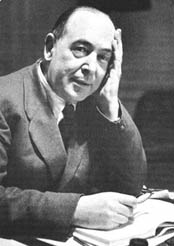I spoke about Mark Galli’s God Wins in the previous blog. (The ebook is now available on Amazon.) Today I’ll deal with Francis Chan’s Erasing Hell, another response to Rob Bell’s Love Wins. Then I’ll compare Chan’s book to Galli’s.
In Erasing Hell, Francis Chan speaks with compassion. You can almost feel him trembling over the issues at stake. He recognizes this debate is about God, His nature and His authority. I sensed both humility and prophetic power in this book.
I’ve talked with Francis personally and been at a few conferences where he’s spoken. It’s like watching a fire burn—you don’t know exactly what’s coming next. That same passion is on the pages of his book. Chan lays his heart on the table. It’s rare that a book mixes straight-from-the-heart talk with careful citation of Scripture. Erasing Hell does exactly that. I was not only informed, but moved.
What I read wasn’t the final edit, so some of the contents may have changed by the time the book’s released in early July. But these were some of the chapters:
Does Everyone Go to Heaven?
Has Hell Changed? Or Have We?
What Jesus Actually Said About Hell
 Chan’s book goes deep and detailed exactly when it needs to. It occasionally appeals to the original languages, e.g. the meaning of the Greek words Gehenna and aionos. It does so in order to deal with misleading statements about those terms in Love Wins.
Chan’s book goes deep and detailed exactly when it needs to. It occasionally appeals to the original languages, e.g. the meaning of the Greek words Gehenna and aionos. It does so in order to deal with misleading statements about those terms in Love Wins.
The author explains that he asked his friend Preston Sprinkle to assist him in the research. That research and Francis Chan’s presentation are a dynamic combination.
Chan is honest, admitting that when it comes to Matthew 25:46 “everything in me wants to interpret it differently, to make it say something that fits my own view of justice and morality.” Then he adds, “But from what I can tell, this is what the text is saying.”
One of the tests of whether we truly believe in the authority of God’s Word is whether or not we bow to it and accept it by faith even when it is painful or disturbing to do so. (What should it tell us if the Bible seems to always agree with us?) Chan models this approach to biblical interpretation. Will we pridefully believe what we want to, or humbly believe whatever God has told us?
 C. S. Lewis said of Hell, “There is no doctrine which I would more willingly remove from Christianity than this, if it lay in my power. But it has the full support of Scripture and, specially, of our Lord’s own words; it has always been held by Christendom; and it has the support of reason.” Dorothy Sayers, another broad-minded Christian, claimed, “We cannot repudiate Hell without altogether repudiating Christ.”
C. S. Lewis said of Hell, “There is no doctrine which I would more willingly remove from Christianity than this, if it lay in my power. But it has the full support of Scripture and, specially, of our Lord’s own words; it has always been held by Christendom; and it has the support of reason.” Dorothy Sayers, another broad-minded Christian, claimed, “We cannot repudiate Hell without altogether repudiating Christ.”
Too many Christians choose to believe whatever makes them feel good, while they ignore, deny, or reinterpret Scripture when it doesn’t fit culture’s current definition of love and tolerance. Hence, culture and the reader of Scripture become the authority, rather than Scripture itself. Faith becomes merely a collection of fleeting opinions, always subject to revision. That is something very different from historic, biblically grounded Christian faith.
Rather than apologize for God, Chan suggests we should apologize to God for presuming to be wiser and more loving than our Savior. Yet he does this while fully acknowledging the heart-rending difficulty of facing the existence of eternal Hell.
How does Erasing Hell compare to God Wins? I would describe Erasing Hell as passionate, biblically reasoned and pastoral. God Wins is historically rooted, theologically reasoned and journalistically precise. Someone who prefers thoughtfully presented theology and history might favor Galli’s book, while someone who enjoys careful exposition of key biblical passages and likes to connect with an author on an emotional level might prefer Chan’s.
I deeply appreciated both books; their content is sufficiently unique to justify reading both. I think it’s a God-thing that these small books are so different, yet complement each other with minimal redundancy. With their different backgrounds, personalities, life experiences, and writing styles, Mark Galli and Francis Chan each bring to the table things the other doesn’t. Reading them back to back, I found they produced a stereo effect that made the sound fuller than either on its own.
 These are both small books. Combined, they are less than 80,000 words, which would total one medium-sized book, still smaller than most theological books. If you are thinking a book can’t be that great if it’s just a critique, realize that both of these authors don’t just respond to Bell, they set forth a positive case for a central biblical doctrine. (Remember too that Luther’s classic On the Bondage of the Will, which he considered his best book, was actually a critical response to a book on free will written by Erasmus.)
These are both small books. Combined, they are less than 80,000 words, which would total one medium-sized book, still smaller than most theological books. If you are thinking a book can’t be that great if it’s just a critique, realize that both of these authors don’t just respond to Bell, they set forth a positive case for a central biblical doctrine. (Remember too that Luther’s classic On the Bondage of the Will, which he considered his best book, was actually a critical response to a book on free will written by Erasmus.)
I love that these authors don’t throw anyone under the bus for raising questions. But neither do they throw orthodox Christians throughout church history under the bus for believing the most difficult teachings of Jesus.
I was encouraged that both my sons-in-law clearly saw the danger of Bell’s book and rose to the occasion in their churches. One, a pastor, produced a podcast on Rob Bell’s book for his church and the other led a study of the book with men in his church. God Wins and Erasing Hell will be invaluable tools for pastors and lay leaders to guide believers in evaluating these doctrines.
Is it possible that God can be loving and that there is such a thing as eternal punishment? The Lord Jesus and Scripture, as understood by the great majority in the early church, the medieval church, the Reformation and the evangelical church, has always answered affirmatively.
Yes, Hell is dreadful, but it is not evil—it’s a place where evil gets punished. Something can be profoundly disturbing yet still be moral. Hell is moral because a good God must punish evil.
Much more is at stake here than the doctrine of Hell and the question of universalism. We don’t own the Christian faith. It isn’t ours to revise. God’s Word wasn’t meant to be given away piecemeal, leaving the next generation with leftovers. If we go on decade after decade parceling out fragments of the faith, what will be left? When we abandon truths Christians once died for, will we no longer have truths worth living for?
Both Chan and Galli recognize that the doctrine of hell isn’t a ballot measure, and God doesn’t give us a vote. There will be no end to dismantling doctrines if we consider it our calling to try to make God look good in our eyes and our culture’s. If his definition of good is different than ours, we dare not expect him to be the one who changes. The Almighty doesn’t need us to give him a facelift and airbrush his image. Our task is not to help people see God favorably but to see him accurately. God has the power, through the true gospel, to touch hearts and draw people to his love and grace while they fully affirm his holiness and justice. It’s not either/or, it’s both/and.
We are tempted to shrink God so he fits inside the borders of our minds. But those are small borders, and he is a big God. There’s great comfort in knowing a God who loves me but doesn’t need my counsel. The best part about Chan’s Erasing Hell and Galli’s God Wins is that as I read both these books, God became greater and I became less.
The vague and tenuous hope that God is too kind to punish the ungodly has become a deadly opiate for the consciences of millions. It hushes their fears and allows them to practice all pleasant forms of iniquity while death draws every day nearer and the command to repent goes unheeded.
A. W. Tozer, The Knowledge of the Holy (New York: Harper & Row, Publishers, 1961), 95.





